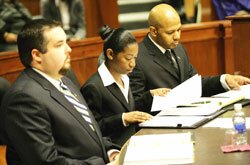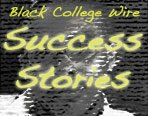| NCCU Law Students Argue Case Before U.S. Chief Justice |  |
 |
 |
| By Geoffrey Cooper -- Black College Wire | |
|
After more than six weeks of case studying, critiques and planning, Dominique Williams was finally ready for his day in court. As the third-year student at N.C. Central University School of Law argued his case before a panel of renowned judges, the butterflies and teeth-clenching questions did not faze him. He knew to stay relaxed and keep his ground. 
NCCU Public Relations
Chief Justice John Roberts
Williams, along with five other finalists, participated in the final round of a moot court competition April 14 at N.C. Central University School of Law. Presiding over the competition was U.S. Supreme Court Chief Justice John Roberts. This marked the first time in the school’s 69-year history that a U.S. chief justice has come to campus. Roberts was accompanied by Allyson Duncan and Henry Frye. Duncan is a former NCCU law professor and the first African-American judge to sit on the United States Court of Appeals for the Fourth Circuit; Frye is the first African-American appointed as N.C. Chief Justice. 
NCCU Office of Public Relations
Defense team Robert Dodson, Kahlida Lloyd, Dominique Williams
The case noted Sell v. United States, in which the U.S. government could obtain a court order to use anti-psychotic medication against a defendant’s will in order to make the defendant able to stand trial. The facts had to meet a four-part test. During the arguments, issues were raised regarding the application and evaluation of the Sell factors that have not yet been addressed by the Supreme Court. Williams, who spoke for the defendant, said he wanted to keep the dialogue between himself and the judges conversational. “The judges really put me at ease,” said Williams. “I appreciate them for making this fun.” Although the judges delivered quick rebuttals and stern questioning to the students’ arguments, in the end each judge gave the students marks of approval for their knowledge and composure. “I’m a little disappointed they weren’t more nervous,” Roberts said jokingly to the audience and both teams after the proceedings. Duncan said she was most impressed with the students’ confidence and wondered if she, along with her fellow judges, were intimidating enough. “They were so self-possessed, confident and poised,” said Duncan. “It is lovely to be back to see the quality of students being produced.” After watching the students perform in court, Frye, a 1959 graduate of UNC-Chapel Hill School of Law, said he wishes he’d had an experience similar to theirs. “You don’t get many opportunities such as this,” Frye said. “It was clear they were ready.” The competition started in January, when participants could side with either the U.S. government or the defendant. Participants prepared a brief, which was examined by faculty, addressing all legal issues raised while attempting to make a sound argument. In February, after oral arguments were held before faculty members and attorneys, four finalists were selected and paired into teams. The teams prepared final case briefs and received training from attorneys on how to orate their arguments. After grueling conferences with area lawyers and judges, second-year NCCU law student Kahlida Lloyd said prayer was her tool in the weeks leading up to the competition. “We all prayed for no nervousness and prayed that we were prepared,” Lloyd said. Lloyd said while she was dead center with the judges, most of her nervousness was channeled through her excitement, calling her experience “phenomenal.” “Just the thought process of being able to represent our law school and this University was something we all felt was important,” Lloyd said. Lloyd and opposing team member Matthew Reeder received the judges’ honor as the competition’s best speakers. Reeder, who will graduate in December, attributed some of the group’s success to their recent visit to the U.S. Supreme Court Building to witness an actual Supreme Court argument. He said this helped him get a feel for what his day in court would be like. NCCU School of Law’s associate dean for academic affairs, David Green, said Roberts had a strong reputation for asking lawyers tough questions during trial. “That’s typical,” said Green. “All the judges’ questions were pretty tough, but the students anticipated that.” Besides judging the mock trial, Roberts was also present April 13 to swear in 20 candidates, all alumni of NCCU School of Law, for admission to the U.S. Supreme Court Bar. In the end, all three judges advised the finalists to slow down when speaking, control the tempo of the argument and understand their cases better than anyone else. Geoffrey Cooper is editor-in-chief of the Campus Echo, the North Carolina Central University student newspaper, which originally published this article. |
|
| Posted May. 05, 2009 |
| < Prev | Next > |
|---|



